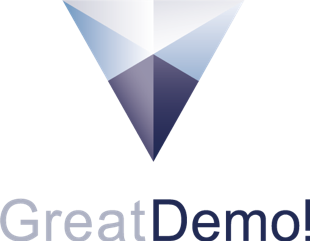Academy PreCongress Training Program

GREATDEMO!
DEMONSTRATION EFFECTIVENESS
 Peter Cohan comes over to Europe and offers a unique opportunity to get introduced to GREATDEMO! strategies.
Peter Cohan comes over to Europe and offers a unique opportunity to get introduced to GREATDEMO! strategies.
Improve your demos and your demo skills. The workshop is specifically focused on organizations providing software for the paperless lab arena. You’ll learn how to apply the surprisingly effective “Do the Last Thing First” strategy to your own demonstrations – an approach that has been delightfully validated in studies of 67,149 demos by Gong.io.
 For those new to Great Demo!, this session will likely change the way you have been presenting demonstrations– rather dramatically for the better...!
For those new to Great Demo!, this session will likely change the way you have been presenting demonstrations– rather dramatically for the better...!
[Monday, 8th April 2019 - 14:00-18:00 CET] Gran Hotel Dino, Baveno, Lake Maggiore, Italy
* The registration to the training is not restricted to the companies sponsoring the event. Any provider delegates can register. Note that registration to the training doesn´t include access to the Congress.
SETTING THE STAGE
FOR PAPERLESS TRANSFORMATION
 Roberto Castelnovo, founder and owner at NL42 Consulting | Paperless Lab Academy, shares its professional expertize and experience in driving successful projects. Learn how to design the most adequate digital transformation strategy for your needs. When it comes to digital transformation projects that aim for flawless paperless laboratory processes a good preparation is key. Such preparation requires considering several parameters such as change management, scope, technical and users requirements, business priorities and corporate commitment.
Roberto Castelnovo, founder and owner at NL42 Consulting | Paperless Lab Academy, shares its professional expertize and experience in driving successful projects. Learn how to design the most adequate digital transformation strategy for your needs. When it comes to digital transformation projects that aim for flawless paperless laboratory processes a good preparation is key. Such preparation requires considering several parameters such as change management, scope, technical and users requirements, business priorities and corporate commitment.
 This training is an excellent opportunity to learn more about the topic and benefit the practical session
This training is an excellent opportunity to learn more about the topic and benefit the practical session
[Monday, 8th April 2019 - 14:00-18:00 CET] Gran Hotel Dino, Baveno, Lake Maggiore, Italy
* Note that registration to the training doesn´t imply registration to the 2 days congress too
OVERALL OBJECTIVES
Introduce a framework, including skills and processes, to create and deliver improved software demonstrations to increase success in the sales and deployment of your organization’s offerings.
Sub-objectives:
- Improve demonstration quality and effectiveness, by implementing a standard process and tools for demonstrations.
- Establish and communicate clear objectives for each demo.
- Increase probability of success for demo outcomes for real-life situations.
- Improve communication, preparation and follow-up between sales and presales.
- Reduce the cost of sales by using demos more judiciously.
- Increase the average deal size and/or sell additional products and services.
- Increase existing subscription expansion and renewals.
WORKSHOP DELIVERABLES AND SPECIFIC LEARNING OBJECTIVES
Participants will learn how to:
- Determine the right content for a demonstration, based on the customer’s business needs and objectives.
- Organize the content in a novel, logical progression that maps to audience needs and depth of interest – and engage and prove your capabilities within the first six minutes of the demonstration.
- Present demonstrations with the highest probability of success in achieving the desired objectives.
Participants complete the Workshop equipped with:
- The initial critical minutes of a newly constructed, highly compelling demonstration of your software, targeted specifically for a typical key scenario.
- The ability to apply the method to develop equally targeted and compelling demonstrations for other scenarios, products, and situations.
The Great Demo! methodology delivers targeted "what's in it for me?" benefits right up front, followed by rapid, targeted proof, and then further, more detailed exploration in accord with the audience's level and depth of interest. This proven, highly successful method maps extremely well to the specific needs and constraints of audiences that can include senior management, middle management, end users, and IT staff.
DESCRIPTION
The Workshop begins by introducing the method and typical results, generating interest in the participants to learn more. An understanding of what constitutes demonstrations and the purposes for delivering demonstrations is developed, followed by exploring the reasons why demonstrations can fail and the resulting impact on the organization.
Next, a method is presented that provides the participants with the tools and processes to ensure that the qualification and discovery information necessary to create successful demonstrations is uncovered and communicated. This segment introduces qualification and discovery steps and methods and defines roles and expectations for Sales and Technical staff. Customer-derived qualification and discovery information is then mapped to the specific capabilities to be demonstrated.
The key components for a demonstration are then developed, including the Customer Situation, Illustrations, “Do It” and “Peel Back the Layers” demo pathways.
Role-play exercises are used to establish the concepts and skills in day-to-day practice for the participants. The scenarios generated by the participants during role-play are developed further during the course of the Workshop.
In accord with time and participant interest, “elective” topics are then addressed. Example electives include Remote Demonstrations (e.g., via WebEx), Managing and Out-flanking Competition, Uncovering and Leveraging Value, RFP’s and Scripted Demos, New Product Roll-out Scenarios, Team Tactics (sales/presales choreography) and Managing POC’s and Evaluations.
OVERALL OBJECTIVES
Introduce the main concepts related to the digital transformation of the laboratories processes, providing concrete examples on how to prepare the project and successfully implement it.
- Improve how project objectives are defined
- Improve the quality of the documentation for the preparation of the project
- Design the best system mapping according to your company’s needs
- Improve how the business case is presented to the company’s management
- Increase the effectiveness of the system selection
- Reduce the implementation risks
WORKSHOP DELIVERABLES AND SPECIFIC LEARNING OBJECTIVES
Participants will learn how to:
- Set the stage for a digital transformation project
- Define how the software systems should fit into the overall strategy
- Select the systems that better suit to the company/laboratory needs
- Design an implementation plan to reduce the related risks
The training offers the opportunity to learn the principles on how to design, prepare and implement a digital transformation project for the laboratories. The attendees will have the opportunity to discuss concrete scenarios and prepare the ground for the journey to digitization. The training is adapted to the audience and typically designed for laboratory managers and scientists, IT staff, operational managers and senior managers.
DESCRIPTION
The workshop starts with the presentation of the overall project of digital transformation, designing the critical steps to be performed.
After the initial presentation, concrete examples are discussed on how to design the project, define the objectives and ensure they are properly communicated within the company, the team members and the stakeholders. Concrete examples can be taken from the audience to explore the challenges related to the correct definition of the objectives, avoiding risks related to miscommunication, setting wrong expectations since the initiation phase.
The workshop then focuses on the preparation of project requirements, with hands-on activities to ensure that the audience is allowed to map the workshop outcome with the real-life situations.
The workshop continues with the preparation of examples of system mapping and the business case.
Specific hints and tips for the selection process are delivered in an interactive manner in order to allow the audience to improve this critical aspect of the project and avoid pitfalls.
The workshop is concluded with the discussion of a typical project plan that can be used during the implementation
